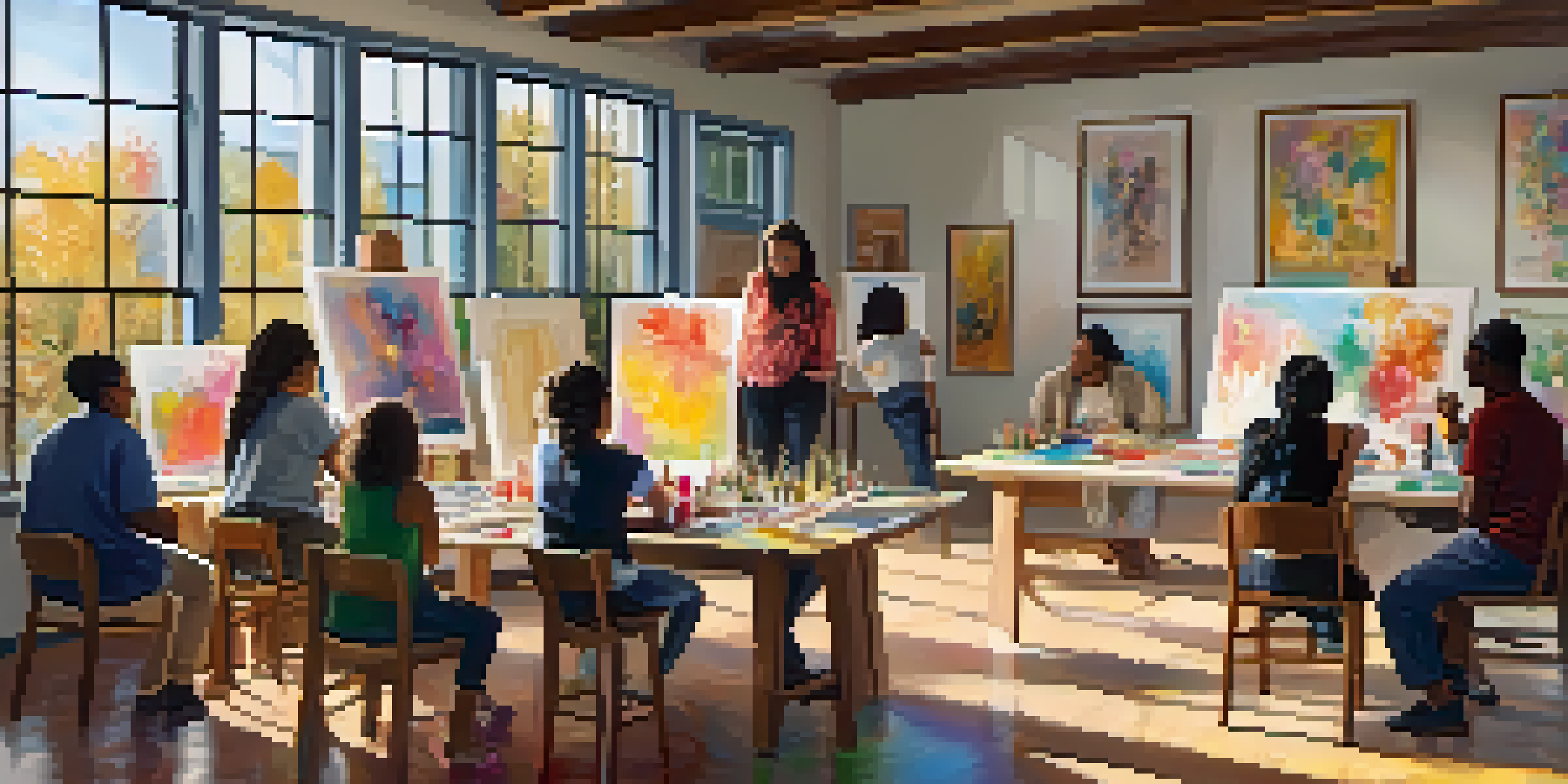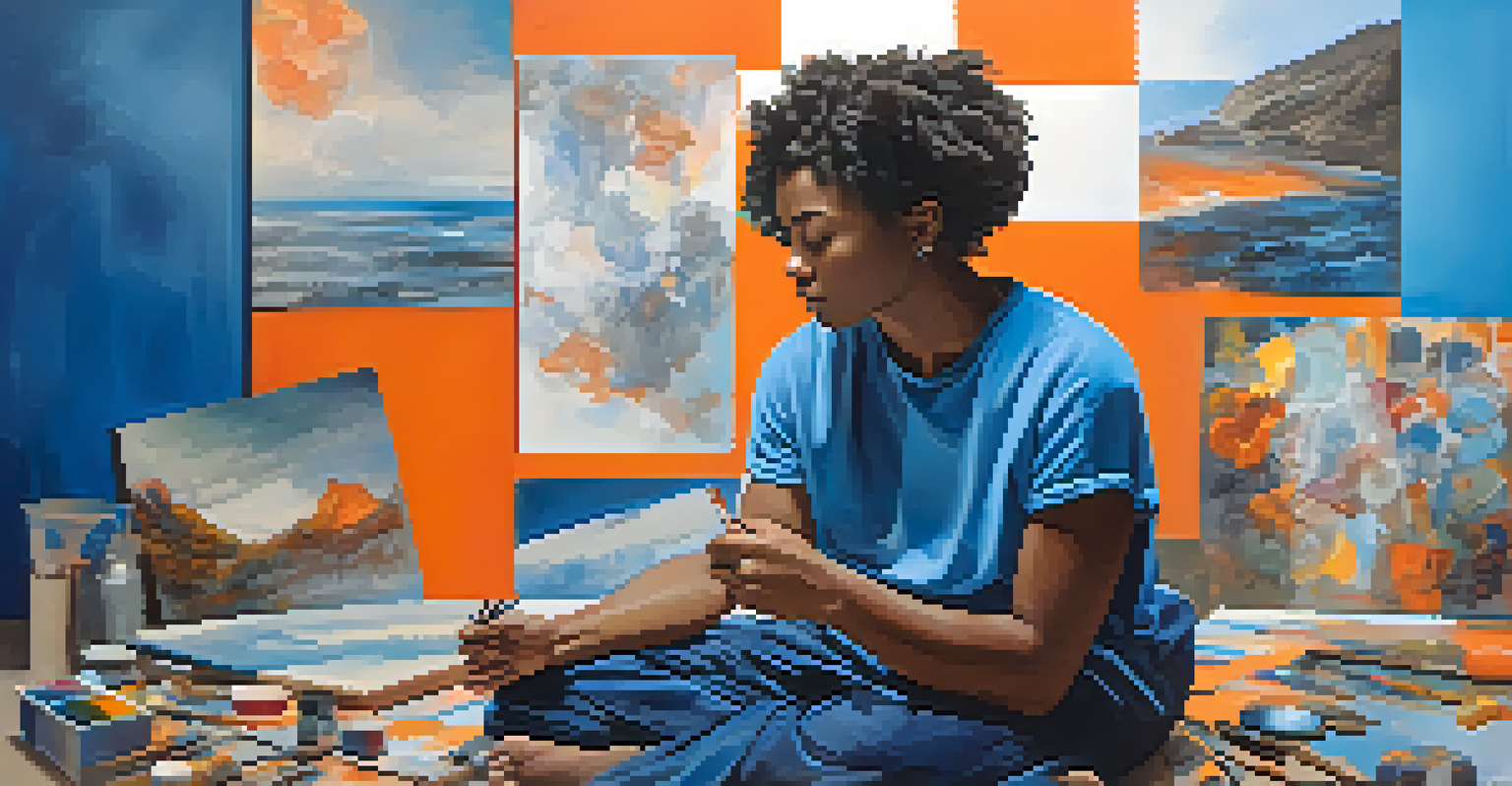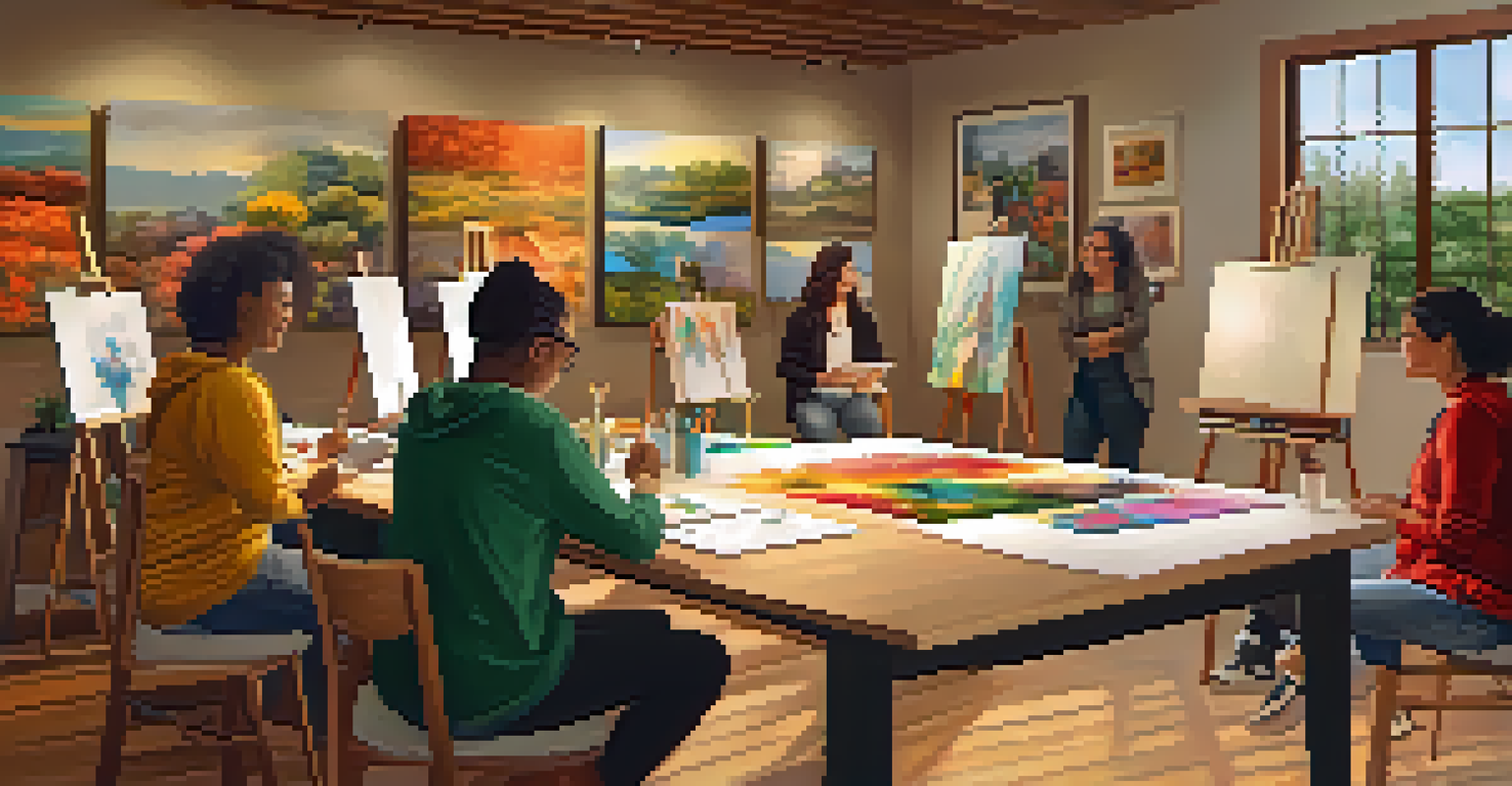Therapeutic Benefits of Art in Addiction Recovery Settings

Understanding Art Therapy in Addiction Recovery
Art therapy is a therapeutic approach that uses creative expression to help individuals process emotions and experiences. In addiction recovery settings, it serves as a powerful tool for self-discovery and healing. This method allows participants to explore their feelings in a non-verbal way, making it particularly beneficial for those who struggle to articulate their thoughts.
Art is a way of recognizing yourself and understanding your place in the world.
By engaging in various forms of art, such as painting, drawing, or sculpting, individuals can express their inner turmoil and begin to confront their addiction. The act of creating something tangible can provide a sense of accomplishment and purpose, which is often missing in the lives of those battling substance abuse. This process not only fosters creativity but also encourages individuals to connect with their feelings.
Furthermore, art therapy facilitates a safe and supportive environment where participants can share their work and experiences. This communal aspect can help reduce feelings of isolation and loneliness, which are common in addiction recovery. By sharing their creations, individuals can build connections and gain insights from others on a similar journey.
Enhancing Emotional Expression Through Creativity
One of the most significant therapeutic benefits of art in addiction recovery is its ability to enhance emotional expression. Many individuals struggling with addiction find it challenging to communicate their emotions verbally. Art provides an alternative outlet for expressing complex feelings that words often fail to capture, helping to bridge this communication gap.

Creating art allows individuals to externalize their feelings, which can lead to greater self-awareness and understanding. For example, a person might paint a chaotic scene representing their inner turmoil, which can serve as a starting point for deeper discussions about their emotions and experiences. This process can be incredibly cathartic and liberating.
Art Therapy Enhances Emotional Expression
Through creative outlets, individuals can articulate complex feelings that words often fail to capture, fostering deeper self-awareness.
Moreover, engaging in the creative process can help individuals identify and confront underlying issues related to their addiction. By visualizing their struggles through art, they can gain new perspectives on their challenges and begin to explore healthier coping strategies. This can lead to significant breakthroughs in their recovery journey.
Building Resilience and Coping Skills
Art therapy not only aids in emotional expression but also plays a crucial role in building resilience and coping skills. Participants learn to navigate their feelings and thoughts through creative processes, which can strengthen their ability to face life's challenges. Art becomes a tool for problem-solving and adaptive thinking, essential skills for maintaining sobriety.
Creativity takes courage.
For instance, when faced with triggers or cravings, individuals who have engaged in art therapy may turn to their creative outlets rather than reverting to substance use. This shift can empower them to manage stress and anxiety in healthier ways. The skills acquired during art therapy sessions can extend beyond the studio, positively impacting daily life.
Additionally, the process of creating art often involves trial and error, teaching individuals that mistakes can lead to new opportunities. This mindset fosters resilience, as they learn to embrace imperfections and adapt to unexpected outcomes. Such lessons are invaluable in recovery, where setbacks can occur.
Fostering Mindfulness and Present-Moment Awareness
Another therapeutic benefit of art in addiction recovery is its capacity to promote mindfulness and present-moment awareness. When individuals immerse themselves in the creative process, they often find themselves in a state of flow, where distractions fade away, and they become fully engaged in the task at hand. This focus helps cultivate a sense of calm and presence.
Mindfulness techniques, such as deep breathing and meditation, can be integrated into art therapy sessions. For example, participants might begin a session with a few minutes of mindful breathing before they start creating. This practice can help ground them and prepare their minds for self-expression, making the experience more meaningful.
Building Resilience with Creative Tools
Art therapy empowers individuals to develop coping skills that help manage stress and triggers, promoting long-term sobriety.
As individuals learn to concentrate on the present moment through art, they may also develop greater awareness of their thoughts and feelings as they arise. This awareness can be instrumental in recognizing triggers and managing cravings, ultimately supporting their journey toward recovery.
Creating a Sense of Community and Support
Art therapy sessions often take place in group settings, fostering a sense of community among participants. This shared experience can help combat feelings of isolation, as individuals connect over their struggles and triumphs through art. The bonds formed in these environments can be deeply supportive and encouraging.
Sharing artwork in a group setting allows participants to express themselves and receive feedback from peers, which can validate their experiences. This interaction not only enhances their sense of belonging but also encourages open dialogue about addiction and recovery. Such discussions can be enlightening and help individuals feel less alone in their journeys.
Additionally, witnessing the artistic expressions of others can inspire hope and motivation. Participants may see reflections of their own struggles in the work of their peers, reinforcing the idea that healing is possible. This supportive atmosphere can be a crucial component of a successful recovery process.
Exploring Identity and Personal Narrative Through Art
Art allows individuals in recovery to explore their identity and personal narrative in ways that may not be possible through traditional therapy. The creative process encourages self-exploration, helping participants to uncover aspects of themselves that may have been suppressed during their time of addiction. This journey of self-discovery can be transformative.
For example, an individual might create a self-portrait that reflects their feelings about their past and hopes for the future. This visual representation can prompt discussions about their identity beyond addiction, helping them reframe their experiences and aspirations. Understanding their narrative can empower individuals to take ownership of their recovery journey.
Fostering Community in Recovery
Group art therapy sessions create a supportive environment where participants can share experiences, reducing feelings of isolation.
Moreover, this exploration can foster a sense of purpose and direction. As individuals reconnect with their values and passions through art, they may discover new interests and aspirations that support a sober lifestyle. This realignment of identity can be a vital element in their recovery.
The Role of Art in Relapse Prevention Strategies
Art therapy can play a significant role in relapse prevention strategies by equipping individuals with tools to manage cravings and stress. The creative process encourages participants to develop healthy coping mechanisms that can be employed when faced with triggers. This proactive approach can make a considerable difference in maintaining sobriety.
For instance, individuals might create a 'craving toolbox,' filled with artistic techniques and activities they can turn to when they feel overwhelmed. This toolbox serves as a reminder of their resources and the positive coping strategies they have learned through art therapy. Having these tools readily available can empower individuals to respond effectively to challenging situations.

Additionally, art therapy encourages ongoing self-reflection and personal growth, both of which are essential for long-term recovery. As individuals continue to engage with their creative practices, they can develop greater resilience and self-awareness, reducing the likelihood of relapse. Ultimately, art becomes a crucial ally in their recovery journey.